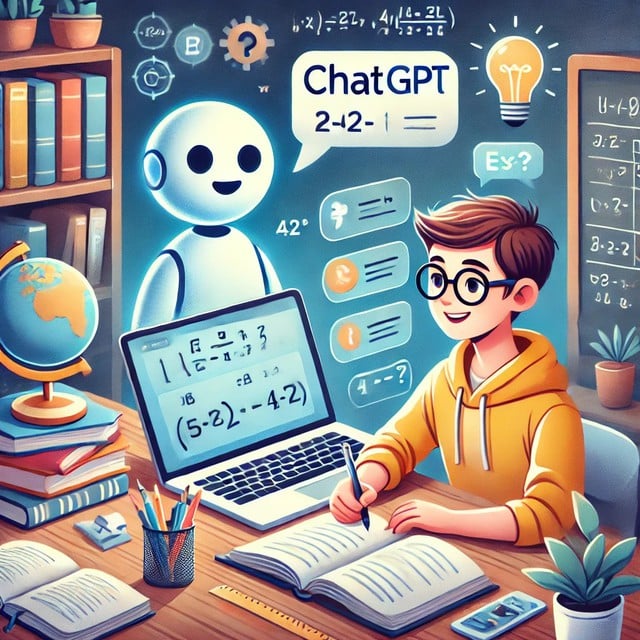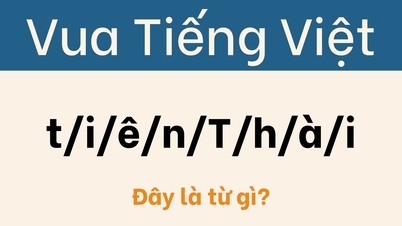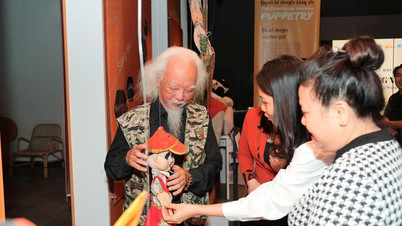But does this artificial intelligence (AI) tool really help improve learning outcomes or is it just a passing trend?
A new study published in early 2025 (Wang, J., & Fan, W. (2025) titled The effect of ChatGPT on students' learning performance, learning perception, and higher-order thinking: insights from a meta-analysis) sought to answer this question by synthesizing and analyzing 51 empirical studies on the impact of ChatGPT on learning. This is a large-scale meta-analysis, providing reliable scientific evidence on the true effectiveness of this AI tool in educational settings.

ChatGPT is not magic, its effectiveness depends a lot on how it is used.
Photo: AI
Does ChatGPT help you study better?
Research shows that ChatGPT has a clear positive impact on learning outcomes. Specifically:
In terms of learning effectiveness, the research results show a very strong impact. This is shown by the overall effect index of 0.867, meaning that students who use ChatGPT often learn much better than those who do not.
Regarding the improvement of learning perception, the research results showed a medium impact, expressed through an overall effect index of 0.456. In other words, students felt more interested and positive when learning with ChatGPT.
Regarding higher-order thinking, including critical thinking, problem-solving ability, and creative thinking, the impact was assessed as medium (overall effect size was 0.457). This suggests that ChatGPT also has the potential to help develop deeper thinking.
So, according to this study, ChatGPT not only helps students "learn better," but also makes learning "more fun" and helps them "think better."
The effectiveness depends a lot on how it is used.
However, one important point this study emphasizes is that ChatGPT is no miracle cure and its effectiveness depends a lot on usage.
According to research, ChatGPT works better in skills subjects, academic writing, and STEM subjects ( science , technology, engineering, mathematics) such as math, physics, and computer science. In addition, models such as project-based learning, problem-based learning, or personalized learning all help ChatGPT to better demonstrate its strengths.
In addition, when ChatGPT plays the role of a "smart tutor" or "virtual classmate", that is, deeply interacting with learners, the efficiency will be higher than just being used as a search engine.
The study also recommends To achieve clear and stable effects, learners need to use ChatGPT continuously for 4 to 8 weeks.
How should ChatGPT be used in the classroom?
Based on the above findings, the research team recommends some of the most effective ways to use ChatGPT:
Combine with clear pedagogical models, such as Bloom's taxonomy, to stimulate higher-order thinking.
Widely used for all levels of education, from maintaining learning interest, improving the ability to remember and understand complex concepts of high school students to meeting the needs of personalization, promoting autonomy and motivation for university students.
ChatGPT can effectively support a variety of courses, from STEM, academic writing to skills training.
ChatGPT helps students access diverse information, simulate learning situations, provide specific instructions, and improve their ability to write accurately and grammatically.
ChatGPT can be applied in different learning models. ChatGPT in particular will best support problem-based learning performance.

When ChatGPT plays the role of a "smart tutor" or "virtual classmate", meaning it interacts deeply with learners, the effectiveness will be higher than just being used as a search engine.
Photo: AI
It should be used systematically and continuously for 4-8 weeks, rather than just a short-term trial. ChatGPT should be used flexibly in teaching as a smart tutor, partner, learning tool... Its role can be adjusted according to the requirements of the teaching and learning activities it is applied to.
From these analyses, the study concluded that ChatGPT, when used correctly, is an extremely useful learning assistant. ChatGPT can help improve learning outcomes, increase learning motivation, and develop higher-order thinking – but only when used correctly.
This study also recommends that teachers, parents and educators, instead of banning students from using AI, should guide and teach how to exploit AI intelligently, selectively, critically and responsibly.
The Dark Side of ChatGPT
While most studies show positive effects of ChatGPT, there are some studies that have found mixed effects:
- Some students become dependent on AI tools, reducing their ability to learn independently and think critically.
- ChatGPT can reduce interaction between students and friends, between students and teachers.
- Some students lose motivation, because learning becomes too easy or less challenging.
- ChatGPT may provide false or inaccurate information.
- ChatGPT can lead to plagiarism and academic dishonesty.
Source: https://thanhnien.vn/chatgpt-co-that-su-cai-thien-ket-qua-hoc-tap-18525051609583671.htm






































































































Comment (0)